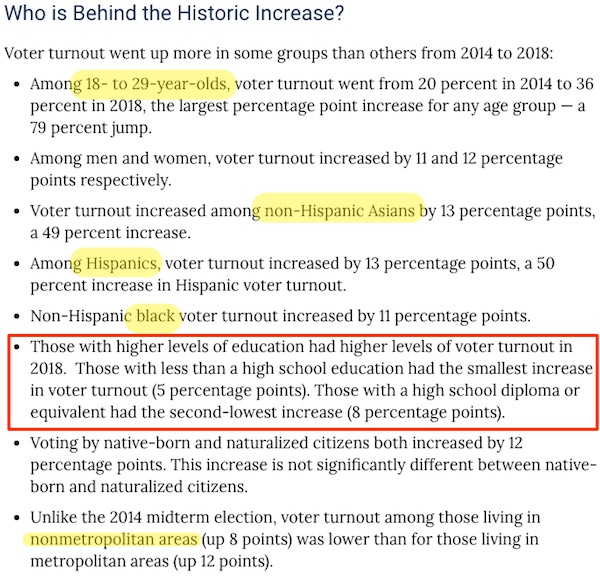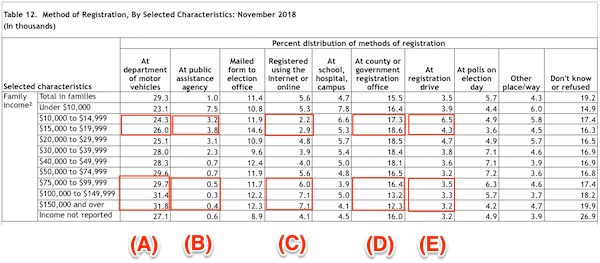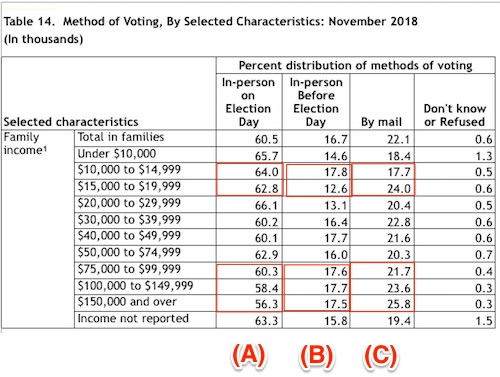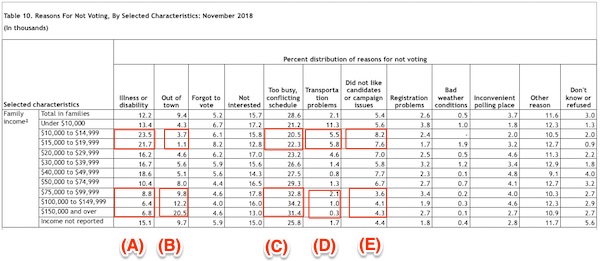By Lambert Strether of Corrente
Alert reader Rolling Mountain threw two interesting links over the transom the other day, both from the United States Census. The first, policy intern Jordan Misra’s “Voter Turnout Rates Among All Voting Age and Major Racial and Ethnic Groups Were Higher Than in 2014” gives a reading on the 2018 mid-terms. The second, “Voting and Registration in the Election of November 2018,” presents a number of tables, also on the midterms.
I’ve never done any serious work with data (at least in this career), and so I thought I would wring what information I could from these two sources using the crude conceptual tools that I have. (The census has a lot of data tools and apps for combining data, which I think a serious analyst would take advantage of.) Misra’s piece shows that the Democrat midterms success could, in fact, be placed under the liberal Democrat orthodoxy of Ruy Tuxiera’s so-called coalition of the ascendant (the concept that Democrats need only wait for demographics to do their work to win power as a party). The tables show how there are many barriers to registering and voting, which in toto amount to optimizing the exercise of the ballot for income, rather as if property were still a qualification for voting, and the franchise was not really universal.[1] (I’m going to present screen shots of the tables with items of interest labeled and highlighted, but they’re too small, I admit. I’m sorry about that. There’s probably a better way, but I don’t know what it is. The Census makes big, big tables!)
First, let’s look at Misra on voter turnout. Here is the relevant part of Misra’s article:

From the highlighted text, you’ll notice that youth, non-Hispanic Asians, Hispanic blacks have all increased, which, given the Democrat victory, jibes with the “coalition of the ascendant” (or “Obama Coalition”) model that I described here:
And here’s Teixeira in 2016, interviewed in WaPo:
PLUM LINE: You define the central question of 2016 as: “Can the “Obama Coalition” survive?” Can you explain what you mean?
RUY TEIXEIRA: The “Obama Coalition” in 2012 consisted of the minority vote (blacks, Latinos, Asians, and those of other races); the millennial generation; and more educated white voters. If you look at the support rates these groups gave to Obama in 2012, and walk those support rates into the probable representation of these voting groups in 2016, the “Obama Coalition” would deliver a third victory for Democrats.
(In the same piece I go on to urge that collection of sintered together demographic cohorts is in no sense a coalition; and if you look at for results from the Democrats’ 2018 victory, you can see that it is in no way comparable to the FDR “coalition,” say. However, you can see how the Democrat leadership would regard 2018 as having confirmed their (Teixeira-driven) priors. They are, after all, in office, if not in power.)
Still looking at Misra, we see the material on education (in the red box). This would Frank’s thesis that the Demorats are the party of the professional classes; given, again, their victory, the Democrats brought their voters out.
Finally, we see that voters in metropolitan areas outperformed those in non-metropolitan areas; so for whatever reason, the Republicans were unable to turn out their voters as compared to their turnout in 2016.
All in all, then, if the 2018 midterms are a dry run for 2020, you can see how Democrats would feel they are sitting pretty. However, I’m unwilling to declare the case for the “coalition of the ascendant” closed, since Misra takes an “identity first” approach to her data; income (as a proxy for class) doesn’t rate a bullet point; indeed the word “income” does not appear in her article. We also have no data on geography at all.
Let’s turn now to the tables, where income happly does appear. There are three (and again, I apologize for the size). For each one, I’ve put red boxes around data I wish to compare, and labeled (e.g. “(A)”) the column of data where the comparison is made. I have used an overly crude poor ($10,00 – $19,000) vs. rich ($75,000 to $150,000) comparison, as opposed to thinking seriously about class.
First, “Table 12. Method of Registration, By Selected Characteristics: November 2018.”

(A): The rich are more likely to register at the DMV than the poor.
(B): The poor are more likely to register at the public assistance agency than the rich.
(C): The rich are more likely to register via the internet than the poor
(D): The poor are more likely to register at government offices than the rich.
(E): Registration drives can successfully target the poor.
Most of this is common sense. Nevertheless, it’s good to have confirmation. I’m also surprised by the DMV result.
Second, “Table 14. Method of Voting, By Selected Characteristics: November 2018”

(A): The poor are more likely to vote on election day than the rich
(B): The poor are slightly less likely use early voting than the rich.
(C): The rich are more likely to use vote-by-mail than the poor.
Note that the propensity of the poor to vote in election day makes them more vulnerable than the rich to manipulations like long lines, false information about voting locations, and the provision of insufficient numbers of voting machines. I was also surprised by the “vote by mail” results; I would have thought the poor would take advantage of it.
Finally, “Table 10. Reasons For Not Voting, By Selected Characteristics: November 2018”

(A): The poor are more likely not to vote from illness or disability than the rich.
(B): The rich are more likely to be traveling than the poor.
(C): The rich are more likely to be busy than the poor.
(D): The poor are more likely to have transportation problems than the rich.
(E): The poor are more likely to dislike candidates or feel their issues are not addressed than the rich.
Surprising, (E), eh?
Well, that’s my first foray into voting data. It seems to me that in a functional democracy, we shouldn’t be seeing differences like this — especially the poor not liking candidates or feeling their issues are not addressed. Since voting systems vary wildly across the country, I’m sure you all have experiences to share that will illuminate this data!
NOTES
[1] The Sanders campaign strategy explicitly involves expanding the base. So we might look as these barriers to registering and voting as a task list for them.


(B): The rich are far more likely to be traveling than the poor.
(C): The rich are more likely to use voter-by-mail than the poor.
My dyslexia kicks in!
“‘(C): The rich are more likely to use voter-by-mail than the rich.”
should read:
“(C): The rich are more likely to use voter-by-mail than the poor.”
Thanks!
RE: “I was also surprised by the “vote by mail” results; I would have thought the poor would take advantage of it.”
It’s mail that comes to an established residency. Think about it that way and you see how problems arise.
Check. That makes perfect sense — and is, in its own way, a property qualification!
I don’t think of it as a property qualification, but moving is a hassle. Updating your address with the DMV and for voter registration is not the highest priority.
I would also think that it is because voting my mail is much more difficult than just showing up on election day (showing up also with your ID, at least in SC). In South Carolina there is a two step process required to vote by absentee ballot. You have to fill out an application, send it in, and then receive your absentee ballot. There is also a long list of restrictions as to who can actually use an absentee ballot. Lambert, I found your article prescient considering there was a long article today in the Washington Post on restricting voter registration, in this case in TN. The article more than confirms the conclusions in your post here. See the article here (no subscription required for the first 5 articles a month).
Here in the state of Washington we switched entirely to vote-by-mail before the 2012 election. But, amazingly to me, the ballots required postage. Not only that, but in some elections the ballot weighed slightly more than 1 ounce, and many people didn’t realize a single first-class stamp was not enough to get it delivered. Now, the cost of mailing a 1.x-ounce letter is in principle a very small price to pay for voting. But it is a price, and it requires a currency–stamps–that is not nearly as available as cash. Fortunately, last year the state finally started pre-paying the postage, but very reluctantly because it costs several million dollars. And, of course, it costs several million dollars because the USPS is a business run on a neoliberal foundation, and it would be unthinkable to offer free delivery of ballots throughout the country.
Great post, Lambert!.
The comparison that absolutely screams at us here is illness/disability. 22% of poor people didn’t vote for this reason vs. 7% of well-off people. Nothing else in the tables comes close to a 15 point difference!
How about that, inadequate health care turns out to be an effective voter-suppression mechanism. Who knew?
Now that we know, how can we counteract it? Facilitate voting by mail among those impacted? Other ideas?
bug for democracy, feature for oligarchy
The other thing that screamed at me is the rich/poor distinction between internet usage. The logic is obvious, but it doesn’t support “the internet is the answer to everything” zeitgeist at all. It’s restriction, not freedom (rather like online banking, come to think about it).
18-29 year olds go from 20% in 2014 to 36% in 2018? Imagine how many will vote in the primaries during an election year. Good news for Bernie.
Not so good for Joe “Give me a break” Biden.
Depends on who those kids are. If they’re the sons and daughters of the professional classes — remember, Misra simply left income out of her analysis — maybe not.
This gap persists even in countries with automatic voter registration, where every registered voter receives a letter with correct date, place and time for voting including a printed form to request a ballot by mail which one only has to complete and put into a letterbox…
https://www.armuts-und-reichtumsbericht.de/DE/Indikatoren/Gesellschaft/Wahlbeteiligung/G20-Indikator-Wahlbeteiligung.html
Unfortunately, the link is in German. The graph denotes voting for the Bundestag, grey line is rich people, blue line is poor people, red line denotes people in between.
Voting since 1991, I never encountered more than 5 minutes waiting time here or walked more than a kilometer to the polling place.
So even in a more or less functional voting system, the poor will be underrepresented. My personal opinion is that being poor means being under so much stress that many people cannot cope with staying engaged, staying informed or simply feel abandoned by the greater society to vote, except maybe for protest votes.
> My personal opinion is that being poor means being under so much stress that many people cannot cope with staying engaged, staying informed or simply feel abandoned by the greater society to vote, except maybe for protest votes.
Yes, if only there were some sort of institution that could reach out to them…
Also, IIRC, Germany uses paper ballots. So it’s possible to design a secure system that works for voters. We just choose not to.
The German system is my standard. Automatic voter registration following citizen registration which is required by law. Proportional representation, one voter – two votes, 5% threshhold for parties to send representatives to the parliament, parties defined within the legal framework, plus the blessings of social democracy: public education including free higher education, investment in public goods, Separation of church and state should be formalized and greater investments in infrastructure. All in all though a big improvement over the American Constitution from 1789.
I find Table 12 especially helpful. With all due respect, American democracy has too often been about preventing participation rather than promoting it. A pernicious anti-democratic feature has been the administration of voter rolls. It remains decentralized, chaotic and vulnerable. The danger posed by spyware infecting e-ballots is negligible compared to the the real damage that results from the failure to automate voter registration for eligible voters as part of the harmonized provision of all municipal services. The burden lies with the citizen to go to the dump to get the dump sticker for her windshield, to go to the school department to register her kids for school, to go to the property tax office to pay her property taxes, to go to the DMV to renew her drivers license, and to go to the voter registration office to register to vote. Typically even when some consolidation of service provision has taken place, voter registration is the last service to be involved. How many municipalities in the US still locate their voter registration office halfway to nowhere? Table 12 captures this unfortunate state of affairs nicely.
As long as the frontier was available, as long as heavy industry needed labor, as long as California had room for another highway, it was easier for the effectively disenfranchised to hit the road rather than confront their exclusion.
American democracy has too often been about preventing participation rather than promoting it.
Exactly! As we get a more historical perspective on our government it seems to me that we are not a democratic state but an oligarchy and have been from the beginning. Thanks to technology and the internet of things if you use YT you can pull up every presidents inaugural speech and it soon becomes clear that they all say what we want to hear and then it is back to making the 1% bazillionaires.
I can’t imagine what would happen if a “Democratic” candidate were to explain how Germany’s government works and that we should study it and create something similar for ourselves. They would probably be tarred and feathered. This place has really gone to the dogs.
In regard to the ‘ascendant’, it is curious to me that Democrats believe that race or ethnicity determines ideology (except, of course, when it determines class, which may be less than some people think.
In regard to the poor not voting, it is true they are discouraged as an official policy. However, I found when trying to organize and inspire them to vote, that poor morale with low expectations of benefit from election outcomes were a far more difficult obstacle to overcome. Among Black people, ‘Yes we can!’ (get a Black guy elected) was followed by the realization later that not much had really changed after all. If one wanted to change that one would have to elect candidates who were practically revolutionaries, and you all know how likely that is.
“Those with higher levels of education had higher levels of turnout in 2018.”
…corollary, higher levels of student debt too…
These will be Biden’s undoing, should the Democrats be foolish enough to nominate him.
45 million Americans have student loans, 22% in default, up to 40% by 2023.
https://studentloanhero.com/student-loan-debt-statistics/
Thanks to Biden, they can never discharge student loans for fraudulent for profit schools, absolute poverty or life long disabilities. Are the Democrats stupid enough to nominate this enemy of the American people?
Bernie or Bust.